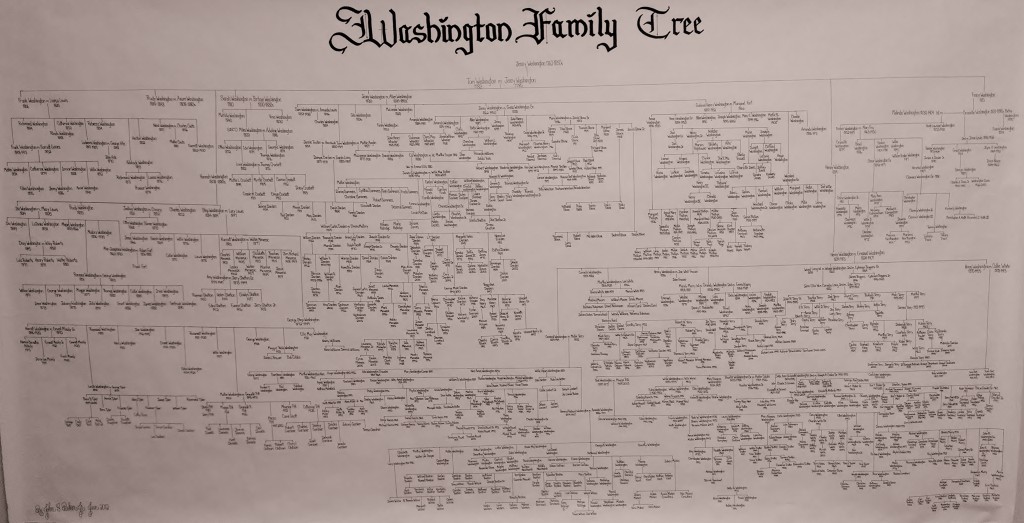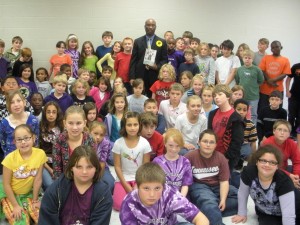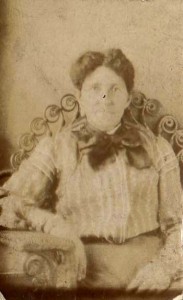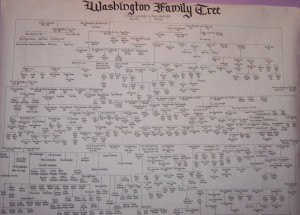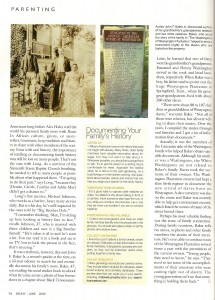One of the items on display at the Tennessee State Museum exhibit Slaves and Slaveholders of Wessyngton Plantation will be a family tree of an enslaved family. The tree spans eleven generations from 1760 to 2012 and includes more than 1,000 direct descendants. In 1814, Wessyngton’s founder Joseph Washington (1770-1848) purchased six slaves from James Thompson: Tom born 1783, his wife Jenny born 1785, their four children Frank born 1806, Hannah born 1808, Sarah born 1810 and Henny born 1814. This was the first nuclear family Washington purchased. Washington later purchased Jenny’s mother, also named Jenny, born in 1760. By the Civil War, this was one of the largest families on Wessyngton Plantation. Many of their descendants still remain in the area. Hundreds of other descendants are spread throughout the United States.
Posts Tagged ‘Genealogy & DNA’
African American Family Tree on Display at Tennessee State Museum Exhibit Slaves and Slaveholders of Wessyngton Plantation
Saturday, January 4th, 2014Author Shows History Begins at Home
Thursday, March 4th, 2010The Washingtons of Wessyngton Plantation reviewed in Nashville City Paper by Todd Dills. Click here to see review.
Washingtons of Wessyngton Plantation: Stories of My Family’s Journey to Freedom – Resource for Educators and Teachers
Tuesday, February 9th, 2010The Washingtons of Wessyngton Plantation: Stories of My Family’s Journey to Freedom has been released in trade paperback and is an excellent resource for teachers and educators. The book chronicles the African American experience from slavery to freedom. It has more than 100 photographs and portraits of African Americans who were once enslaved. The book covers many aspects of plantation slavery, the Civil War, Reconstruction, Jim Crow, Genealogy, and DNA testing.
http://books.simonandschuster.net/Washingtons-of-Wessyngton-Plantation/John-F-Baker-Jr/9781416567417
Washingtons of Wessyngton Plantation Presented to Gateview Elementary School Students in Portland, Tennessee
Monday, November 30th, 2009On November 20th I had the honor of delivering a presentation about my book The Washingtons of Wessyngton Plantation to the entire fifth grade class at Gateview Elementary School in Portland, Tennessee. More than 100 students attended. Prior to my visit the students had studied the Civil War, which tied into my program. The students were very attentive and had many questions. Following the presentation many of the students expressed an interest in tracing their genealogy.
Divorce Case of Former Slaves Reveals Family History
Friday, October 23rd, 2009Today divorce is very common, but in 1800s and early 1900s it was rarely heard of, especially among African Americans. In my research I found this extraordinary divorce case of two former slaves in Robertson County, Tennessee which detailed the history of their family.
Alford Pitt 1830-1900 and his wife Arry Fort Pitt 1836-1918 were married during slavery and had eleven children. Alford was a carpenter and later accumulated more than 500 acres of land. He had African American and white sharecroppers working his land.
In 1900, Arry filed for divorce from Alford stating that he had an affair with two black women and one white one. She stated that she had worked hard to help him amass everything they owned and she was entitled to half. Alford claimed that she had not helped him accumulate his wealth and felt since they married during slavery and never married after they were emancipated that she was not legally his wife and therefore not entitled to any of his property.
The divorce case put a great strain on the Pitt family, their friends and neighbors. Arry had more than fifty witnesses to prove her claims and Alford had nearly as many to support his. Half the children sided with their mother and the others their father.
Arry was represented in court by a family member of her former owners. In 1866, a law was passed in Tennessee which made all former slave marriages legal if the couple continued to live as man and wife.
The courts ordered Alford to give Arry 100 acres of land, $1,000, a horse and buggy and other livestock. Shortly after the verdict Alford died from complications of a cold that he caught from walking to court in bad weather.
Some of the Pitt property is still owned by their direct descendants. A street that runs through the property bears the family name.
Creating a Family Tree
Wednesday, June 3rd, 2009One of the most exciting things about genealogical research is meeting new family members. In conducting research for more than thirty years I’ve found hundreds of relatives. I created this tree which spans ten generations and includes more than 600 names of descendants from my great-great-grandparents Emanuel and Henny Washington. I have genealogical information on all the families that came from Wessyngton including: Washington, Blow, Gardner, Terry, White, Williams, Lewis, Scott, Green and many others.
Television Interview with John Seigenthaler Sr.
Monday, May 18th, 2009My half-hour television interview with John Seigenthaler Sr, A Word on Words, is available as a free downloadable Podcast.
http://www.wnpt.org/productions/wow/
Mr. Seigenthaler asked me many in-depth thought-provoking questions. At the end, he said, “I learned more from your book than I learned from reading my friend Alex Haley’s book called Roots.” I hope you enjoy the interview. Leave a comment with your reaction.
My Story in June Issue of Ebony
Monday, May 11th, 2009Check out my story in this month’s Ebony. “Telling our Stories: Relaying family history to children can keep our heritage alive.” On page 94, Shirley Henderson describes my story. A photograph of my ancestors and the Wessyngton Plantation slave cemetery memorial illustrate the article.
Genealogy Tips #1
Sunday, March 22nd, 20091. Start with yourself
The first step in tracing genealogy is to start with yourself and work backwards.
Start with what you know such as the names of parents, grandparents etc. then search
for the unknown.
2. Interview older relatives
Older family members can give you personal information about your ancestors
not found in official records. They may also give you information that will lead you
you to other genealogical resources such as the names of extended family members,
locations where family members lived during a certain period, birth, marriage, and
death dates of family members. Always record the interviews if possible.
3. Copy old photographs
Copy all old family photographs and share them with family members. Be sure to
record the names of all persons featured in photographs on the back. We have all
seen old photographs of family members that no one can identify.
4. Share information with family members.
Always share what you find with family members. If you share information others
will likely share with you.
5. Organize your work
Always organize your research and cite sources so the information you find is
useful to others.
Sirius XM Radio Interview with John F. Baker Jr.
Friday, March 13th, 2009I invite you to listen to an indepth interview: On with Leon Presents John F. Baker Jr. with host Dr. Leon Wilmer.
